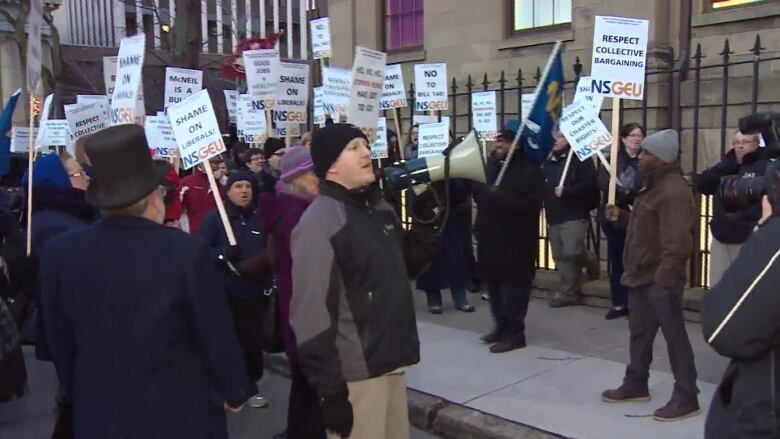Persistence is the most powerful force in politics, says Graham Steele
Province House passed Bill 148, despite organized protests by unions and their members

On December 16th, we saw a protest at Province House against Bill 148, the latest labour-relations law from the McNeil government.
We also saw unions, and many of their members, appear before the law amendments committee to urge that Bill 148 not be adopted.
Bill 148 did pass, of course.
Not only did it pass, but it passed exactly as we would expect: with all members on the government side voting in favour, and all members on the opposition side voting against.
Did you ever wonder if protests do any good?
No straight line
I've been watching Nova Scotia politics very closely for 18 years, and I can't think of a single example where a straight line can be drawn between a placard-waving, flag-flying, bullhorn-blaring protest at Province House and a change in government policy.
I think most such protests are a waste of time, if the objective is to try to get a government to do something, or to stop doing something.
I can't help feeling that certain frequent flyers,especially the public-sector unions,organize protests at Province House only because it's what they've always done.
They do it out of habit rather than conviction.
Raising morale
That doesn't mean protests are useless.Protests can raise morale among a dissatisfied group, by showing members "you're not alone"or "we're still fighting."
It can sometimes raise public awareness, especially if there's media coverage.
And the news media does love a protest.
Protests can provide colour, noise and conflict to otherwise dry policy issues.
Protesters are usually happy to be quoted, and are often more accessible than the decision-makers themselves.
Media coverage is ephemeral, though.Besides, protesters shouldn't confuse "we were on TV"with "we made a real impact on government policy."
Riding it out
From the politician's perspective, a protest is pretty easy to ride out.
If an issue has gotten to the point of a street protest, chances are you've already heard the protesters'arguments.You're not likely to hear anything you haven't heard before.
So if you're walking towards a protest, you have a choice: stop and talk to the protesters out of politeness, or keep walking.
The first is obviously preferable, and frankly most protests are reasonably good-natured.But it depends on the circumstances the size and mood of the crowd, what the issue is, and whether reporters are around.
If the protesters are in a bad mood, they may say mean things, but if you keep striding there's really not much they can do.A thick skin helps.Once you get into Province House, you're clear.
Leaving Province House in the midst of a protest can be a problem.Over my time in politics, I've seen the police called in a few times to escort government MLAs out of the building.But most of the time, the protesters are long gone by the time the House wraps up.
In sum: A politician isn't affected by a protest because the pressure is not sustained.
Persistence works
So what is effective, if street protests aren't?
The most powerful force available to the citizen advocate is persistence.
Persistence is the steady tap-tap-tap of interactions between citizens and politicians that tell the politicians they're doing the wrong thing.
On the street, in the grocery store, in the coffee shop, in their office, over the phone.
Nothing flashy or loud, but repeated.
Not just one person, but many.
Not rude or aggressive, but firm.
Not just one phone call, but regular phone calls.
Not just one e-mail, but a steady stream over time.
Social media, especially Facebook, are also powerful tools, and more democratic too.Not everybody can get to downtown Halifax to stand outside Province House, no matter the day, no matter the weather.
The point is to be so persistent, especially in the constituency, that the politician knows you will never go away until they do the right thing.
Persistence is powerful, but it's not magic.Sometimes what you're asking for isn't reasonable.Sometimes you and politician simply don't agree, and never will.That's part of democracy too.
But persistence is, in my experience, the most powerful force in politics.
For the activists who think that a noisy street protest is the same thing as being effective: you just carry on doing what you're doing.It hasn't worked before, but maybe it will next time.












_(720p).jpg)


 OFFICIAL HD MUSIC VIDEO.jpg)
.jpg)



























































































